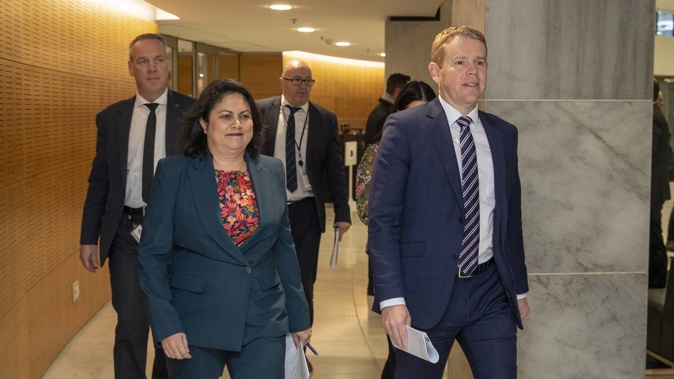
With reported case numbers and hospitalisations on the rise for the first time since May, the Government is considering dropping the last of its Covid restrictions.
Most Covid-19 rules were dropped a year ago, including the vaccine mandates, as the virus infected all corners of the country and New Zealanders moved to the inevitable phase of living with it.
In April Cabinet reviewed the seven-day isolation rule and mandatory mask-wearing in most healthcare settings, and decided to keep them until the end of August to help ease the pressure on hospitals during the onset of winter.
Today Cabinet reviewed them again, and Prime Minister Chris Hipkins and Health Minister Ayesha Verrall will announce Cabinet’s decision at the 4pm post-Cabinet press conference.
Hipkins has previously signalled it was “likely” that there would be a return to “business-as-usual for the health system”.
One of the key questions around maintaining the restrictions is whether they’re still making any difference. If many people aren’t bothering to isolate once testing positive - if they’re testing themselves at all - then keeping the rule is somewhat redundant.
And while wearing a mask in a healthcare setting would still help to keep an infected person from infecting others in a hospital or doctors’ waiting room, it’s a risk for the Government to keep imposing rules on a population that has largely moved on.
If both measures are dropped, public health experts will likely continue to ask New Zealanders to stay home if they are sick and to use a mask if visiting the vulnerable.
Cases and hospitalisations on the rise
A year ago daily case numbers were running at nearly 7000, amid a winter wave that left thousands of Kiwis in hospital with the virus.
The latest weekly Covid statistics show 5372 new cases - half of them reinfections - in the week to August 13, an increase of 763 cases from the previous seven-day rolling average. This follows an increase for the week to August 6, when there were 659 more cases.
As of August 13, there were 171 cases in hospital (11 more than the previous week) including four in ICU (down from five), with three deaths in the past week, bringing the total number of deaths attributable to Covid to 3249.
Reporting on the previous week, a Ministry of Health summary said: “Reported case rates for the week ending August 6 have increased for the first time since the end of May 2023. In the week ending July 30, hospital admissions, viral RNA in wastewater, and mortality decreased or remained stable compared to the previous week.”
The seven-day rolling average of reported case rates was 12.6 per 100,000 people for the week ending August 6, up from 9.9 per 100,000 people for the previous week - or a 27 per cent increase.
The hospitalisation rate over the same period dropped from 0.43 to 0.40 per 100,000 people, while the mortality rate was stable at 0.03 per 100,000 people - though both of those rates increased in the last week.
How much the case rates tell us, though, is questionable, given how they’re thought to be a fraction of the reality - as little as one in four actual infections - due to how few people are now testing and reporting a positive result.
A report in April by Covid-19 Modelling Aotearoa showed that if the isolation rules were axed, hospitalisations and deaths could rise by between 13 to 25 per cent over six months if the Government ended mandatory isolation for Covid cases.
But that does not appear to have happened, with hospital numbers and the amount of Covid in wastewater declining in recent months.
Covid-19 modeller Professor Michael Plank said last month that case numbers were low because there might be less virus circulating in communities, probably due to high population immunity.
“If we look at hospital numbers, they’re almost at an all-time low since Omicron arrived as well – and we can see that the level of virus being detected using wastewater surveillance is also at a very low level,” Plank said at the time.
One of the remaining major uncertainties from the global pandemic is how many people will have Long Covid, and what pressure that will put on the health system.
The Ministry of Health has said it’s not possible to quantify just how many people are living with the post-viral condition today.
A constellation of persisting symptoms thought to accompany 10 to 20 per cent of infections, Long Covid can affect nearly every organ system in our bodies – yet there remains no universally-established treatment or cure.
A major study published earlier this year found that one in five participants reported Long Covid symptoms after their initial infection – and that many patients were still struggling to get help.
Derek Cheng is a senior journalist who started at the Herald in 2004. He has worked several stints in the press gallery and is a former deputy political editor.
Take your Radio, Podcasts and Music with you









